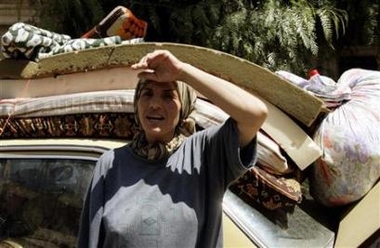 BEIRUT (Reuters) –By Alistair Lyon, Special Correspondent Jad Haider is ready to pack his bags for Germany, fed up with Lebanon’s political instability, simmering sectarian strife and economic malaise. I love this country so much. It’s a beautiful country, but honestly I just can’t take it any more," said the 32-year-old university English teacher. "The energy is so negative."Jolted by last year’s war between Israel and Hezbollah and the power struggles and Sunni-Shi’ite clashes that have followed, thousands of Lebanese — many of them young and talented — are leaving to seek jobs and new lives abroad.
BEIRUT (Reuters) –By Alistair Lyon, Special Correspondent Jad Haider is ready to pack his bags for Germany, fed up with Lebanon’s political instability, simmering sectarian strife and economic malaise. I love this country so much. It’s a beautiful country, but honestly I just can’t take it any more," said the 32-year-old university English teacher. "The energy is so negative."Jolted by last year’s war between Israel and Hezbollah and the power struggles and Sunni-Shi’ite clashes that have followed, thousands of Lebanese — many of them young and talented — are leaving to seek jobs and new lives abroad.
"I’m not willing to stay in a country where one day you wake up and there’s a war, the next day you wake up and everything’s fine," Haider said. "This is no way to live."The scale of the hemorrhage is hard to pin down, especially in a land with a long, fluid history of migration and return, but researcher Eugen Dabbous said a survey he had helped to run had confirmed many Lebanese are heading for the exits."Sixty percent of those surveyed want to leave," he said. The project, conducted by the Lebanese Emigration Research Center, questioned about 600 residents from two groups — students or recent graduates and middle-aged people."The younger people want to leave because they don’t see a future in Lebanon, and the older group because they want to get their children out of harm’s way," Dabbous said.
He said up to a million of Lebanon’s estimated four million citizens already live abroad, mingling with a far bigger Lebanese-origin diaspora born of two centuries of migration.
Once mostly Christian, the outflow now affects Lebanon’s Shi’ite and Sunni Muslim communities just as much. Many who left during the 1975-90 civil war sank permanent roots abroad.
JOB CRISIS
"This economy is oriented only toward the commercial banking system and real estate, so we don’t have enough employment opportunities," former Finance Minister Georges Corm said.
"With the oil boom in the Gulf countries, it is by the tens of thousands that people are going there to find jobs."
So many Lebanese have left for the Gulf in recent months that wages there have declined, said Carole Contavelis, a recruitment consultant for Beirut’s Headhunter International.
Of 19 people she interviewed for a general manager post in Beirut, 15 had left the country: "At the upper management level, it’s 70-80 percent who are out of Lebanon."
Contavelis said the employment market had been "awful" since last year’s war and was still getting worse, while political instability meant no one could plan their lives sensibly.
"Now with the brain drain, we don’t have a middle class any more," she complained. "How can you build a country like that?"
Asked what would have to change to induce people to stay, she said: "Frankly, everything. No bribery. We need security, clean politicians. They are treating us like cows, but we don’t want to follow any more. We want to be here for our country."
But for people like Assad Ghosn, 33, a manager at the Alfa mobile telephone company, hard choices are pressing in.
"All my close friends from university are living abroad now. During the war, we were close to leaving, but we decided to wait and see what happens," he said at his Beirut office.
Ghosn, who also has a Canadian passport, said his wife Gia was keener to leave than he was. "You have to think about your career and the future of our baby," he said. "We have relatives in Canada, but it’s not an easy decision. Personally, if I go out for a career, I won’t come back here."
FAMILY TIES
Many Lebanese hold second or third passports, acquired through family networks already overseas. Lebanese have spread all over the world, with big communities in the United States, Canada, Australia, Brazil, France, West Africa and the Gulf.
They tend to retain strong business, family or emotional links to their homeland, and many send money home to support their relatives, but Sensenig-Dabbous said few were planning to return to Lebanon now or invest there.
Grace Harika Nasnas, who lives in Florida, spent five months in Lebanon last year looking for a house to buy so she and her family could return. The outbreak of war on July 12 forced an abrupt change of plan. She left hastily with her two sons.
"When the Israelis hit the airport, I’m like, it’s gonna be just one bomb. I didn’t think it was gonna go that far," the 31-year-old recalled in a telephone conversation from Orlando.
"We always had hopes to go back and live in Lebanon. But even before the war I didn’t see much opportunity for my husband to work there. It was a big risk to invest our money in something that might work or might not."



